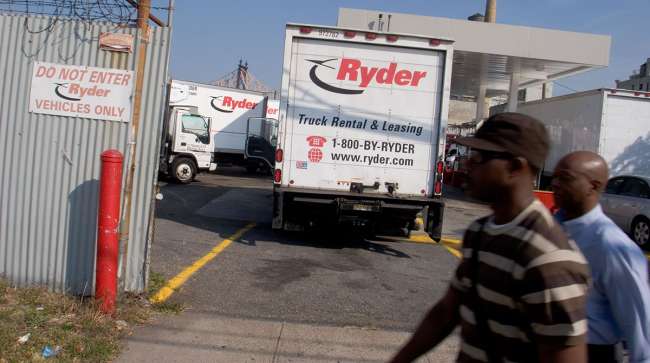Senior Reporter
Ryder Announces Truck Sharing Program to Begin Next Month

Ryder System Inc. said it began launching on April 1, in Atlanta, the first business-to-business platform where commercial motor vehicles can be shared when they are not being used by the company that owns the truck or trailer.
COOP by Ryder will allow trucking and transportation companies to list online and rent their available Class 8 and other trucks, trailers, and vans to businesses — and in some cases a transportation company’s competitor.
For several months a pilot program has been underway in Atlanta, and Ryder said its success convinced the company it can eventually do this nationwide. It plans to expand the program to other cities in 2019.
“COOP by Ryder aims to revolutionize the optimization and utilization of commercial trucks by helping fleet owners get the most value out of their fleets,” said CEO Robert Sanchez. “Seasonal and cyclical truck shortages, coupled with fleets’ excess and unused capacity, demonstrates the benefit of having a technology like COOP available in the marketplace. COOP represents one of several strategic investments we are making to leverage technology and capitalize on disruptions our industry will see over the next five to 10 years.”
It is estimated there are 8 million commercial vehicles available and on the road. Ryder’s research showed that 25% of all fleets sit idle for at least 24 hours, excluding weekends, and the available capacity can be better utilized, allowing sellers to make money off their parked trucks, and other companies would have access to a larger inventory of trucks and trailers to rent, instead of having to make a purchase.
“It’s not always about borrowing, it’s also about lending. Think about your fleet and the cost you sink into your fleet. The lenders are finding it’s highly valuable,” Karen Jones, chief marketing officer at Ryder, said. “If you’re watching a truck sit against a fence and it’s not operating and you’re paying for that truck, whether it’s a lease or you bought it outright, there are just costs on a daily basis. So this is really providing an avenue to offset the investment you have made in your fleet as well.” As with similar asset sharing businesses, both buyers and renters will be rated to ensure the process works smoothly. To be enrolled in COOP by Ryder, a potential company must have a valid U.S. Department of Transportation registration, a satisfactory safety rating from the Federal Motor Carrier Safety Administration, and a minimum of $1 million in liability insurance. Rentals can be a minimum of one day and up to 30 days. Ryder estimates a seller making available a 26-foot straight truck, traveling 100 miles per day, can generate thousands of dollars per month in revenue.
The system is set up to use on-demand pricing, increasing rental rates during peak hours, and lowering them during off-peak times. Ryder will receive a percentage of the transaction, ranging from 20% to 40%. Still, Ryder says in most cases the overall cost for a truck will be less than a conventional rental.
Ryder will cover much of the paperwork, including physical damage insurance and 24/7 roadside assistance. Once the vehicle is returned the owners of the truck are automatically paid online.
Ryder acknowledges its business model is very similar to Airbnb, which has been in existence since 2007 and generated $93 million in profits last year on revenue of $2.6 billion.
Based in Miami, Ryder Transport Solutions had $7.3 billion in revenue in 2017. It ranks 13th on the Transport Topics Top 100 For-Hire Carriers and seventh on the Transport Topics Top 50 Logistics Companies.

